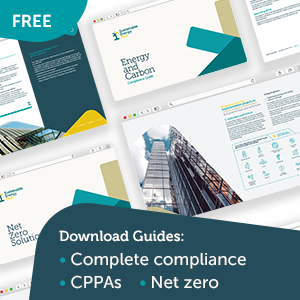A corporate power purchase agreement (CPPA) is an increasingly popular option for businesses who want to stabilise their energy costs and cut carbon emissions.
Now experts predict an exponential rise in the number of CPPAs signed over the next few years, with a greater proportion of such contracts being signed by lower energy users. If your business is one of those considering this step, there are five questions you should ask first.
1. Is your site suitable for generation?
If the site of your business is suitable for generating renewable energy, such as wind turbines or solar panels, this is the most efficient option to consider for your CPPA. A renewable energy generator would build the asset on your land and connect it directly to the buildings on site. This direct type of CPPA, sometimes known as private wire, bypasses the grid entirely. This means that the energy you use from the asset will not incur any non-commodity costs. Whereas most businesses are unable to meet 100% of its energy needs from a physically connected renewable asset, so you will still need to explore other types of CPPA or supplementing with grid energy. But it is well worth exploring the feasibility of on-site assets when considering a CPPA.
2. What volume of energy do you need?
Traditionally, Corporate Power Purchase Agreements (CPPAs) required businesses to purchase significant energy volumes, typically making them accessible only to large energy users consuming around 20GWh annually. These users often seek long-term hedges for up to 90% of their energy needs, while larger consumers might commit to smaller percentages of their total demand. However, new opportunities are emerging for smaller energy users, such as “basket” CPPAs. These agreements allow multiple smaller organisations to pool their requirements and collectively contract with a single renewable energy generator, making CPPAs more accessible and flexible.
If CPPAs aren’t quite right for you, our Sustainable Energy Consortium is a unique green energy procurement route with additionality. We have partnered with a broad set of renewable energy generators across the UK – and we match them with businesses, to supply deep green energy with significant commercial benefits, such as relief on some non-commodity costs and a secure agreement that is typically shorter than CPPA contract lengths. The Consortium is ideal for organisations that want to secure traceable green energy from generators but may find a CPPA unsuitable or unviable.
3. Where do you stand with your current contract(s)?
Before considering a CPPA, it’s essential to evaluate your current energy supply arrangements. When does your existing contract end, and are there penalties for early termination or adjustments to its terms? Rather than terminating a contract prematurely, we typically recommend aligning CPPA projects with your contract’s end date. Additionally, check if your current supplier can facilitate “sleeving” CPPA volumes—an important consideration when planning your energy strategy.
4. How long is your business prepared to commit?
Most CPPAs are for between five and 20 years, with the typical contract length being 10 years. This is significantly longer than most commercial energy supplier contracts, which tend to be between one and five years. The reward for this longer-term commitment is budget certainty and protection from wholesale energy price rises, as well as not having to pay non-commodity costs, which make up a large proportion of a business energy bill.
5. Are you working on cutting consumption?
The motivation for signing a CPPA is likely to be either reducing costs, reducing carbon emissions or a combination of the two. But many businesses have yet to tackle even the “low-hanging fruit” of energy efficiency. Whatever CPPA you choose will deliver better results if the energy you source through it isn’t being wasted on unnecessary consumption.
Businesses in scope of the Energy Savings Opportunity Scheme (ESOS) have an advantage here because their compliance work means they have a ready-made list of energy-saving measures that will pay for themselves in a short time. Businesses not in scope should consider taking expert advice on how to cut consumption.
Other things to consider…
Advice on CPPAs
If you are considering a CPPA or want to learn about alternative green energy procurement routes, get in touch. We successfully negotiated a 15-year CPPA for BNP Paribas, and we’re helping itsu save £460k through our Sustainable Energy Consortium.
If you want to discuss all the ways we can help your company access true renewable energy please complete the form below.







